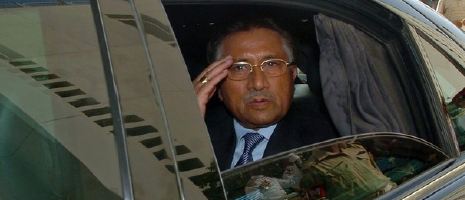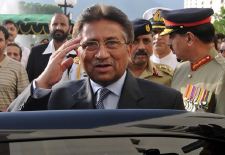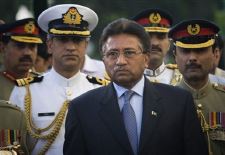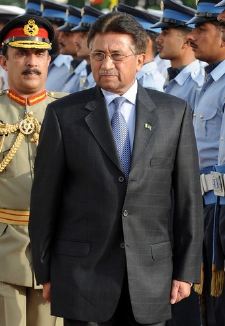Adil Najam
In a nationally televised speech, Gen. Pervez Musharraf, President of Pakistan, has just announced his resignation, pre-empting a move to impeach him by the parliament.
This post has been updated to add news photos from this momentous day in Pakistan’s political history. The pictures speak eloquently of the moods and thoughts of the day. (Scroll down to see the video of Gen. Musharraf’s resignation speech).
Participate in a poll on what might be Pakistan’s future post-Musharraf, here.
![]()
Here is a Pervez Musharraf time-line, published in The News:
August 1943: Born in Delhi, India
1964: Joins Pakistani army.
1998: Becomes army chief of staff.
October 1999: Seizes power in a bloodless military coup, overthrowing the prime minister, Nawaz Sharif. In response, the Commonwealth suspends Pakistan’s membership.
June 20 2001: Makes himself president, replacing Rafiq Tarar, while remaining head of the army. Tarar is forced out of office when the parliament that elected him is dissolved.
July 2001: Holds first meeting with the Indian prime minister, Atal Bihari Vajpayee, at Agra in India. No progress is made because of differences over the disputed territory of Kashmir.
September 2001: George Bush courts Musharraf, asking him to join him in his “war on terror” and help defeat the Taliban in neighbouring Afghanistan. The US president promises Pakistan $1bn in aid.
April 2002: Wins a referendum giving him another five years in office. Observers criticise the referendum as blighted by irregularities.
May 2002: Pakistan test fires three medium-range surface-to-surface missiles capable of carrying nuclear warheads. Musharraf insists his country would not be the one to initiate war.
August 2002: Consolidates his power still further, giving himself the right to dismiss an elected parliament.
October 2002: Pakistan’s first general election since Musharraf seized power in 1999 results in a hung parliament.
November 2002: Mir Zafarullah Jamali becomes the first civilian prime minister since 1999. He is a member of a Musharraf-supporting party.
November 2003: Pakistan’s National Assembly meets for the first time since 1999.
December 2003: Musharraf promises to step down as head of the army by January 2005.
May 2004: Pakistan is readmitted to the Commonwealth.
December 2004: Musharraf announces he will stay on as head of the army.
August 2005: Pakistan tests its first nuclear-capable cruise missile.
March 2007: Musharraf suspends the chief justice, Iftakar Mohammed Chaudhry, triggering a wave of anger across the country and the first joint protests held by the parties of exiled former prime ministers Benazir Bhutto and Nawaz Sharif.
October 2007: Signs a corruption amnesty, opening the way for Bhutto’s return and a possible power-sharing agreement. Within hours of Bhutto’s arrival back in the country, bombers attack a Bhutto rally in Karachi, killing more than 100 people.
November 2007: Declares a state of emergency, rounding up opposition leaders at gunpoint. In the same month, Musharraf quits as head of the army, becoming a civilian president.
December 15 2007: Lifts state of emergency and announces plans to go ahead with parliamentary elections scheduled for January 8.
December 27 2007: Benazir Bhutto is assassinated at an election rally in Rawalpindi.
January 2008: Elections postponed until February 18.
February 2008: The two main opposition parties gain a clear majority in the elections.
August 2008: The two main parties strike a deal to impeach Musharraf if parliament backs the move.
August 18 2008: Musharraf announces his resignation



























































He may not be a good person, but it sad to see him go.
He is the only kursiwala who resigned and is not killed or thrown out.
The most important thing is what next? considering the crooks in line for the job I would wat to keep him.
May be he is on to something else?
Sad to see him go- on the whole a decent guy who made a few mistakes along the way-sacking judges, emergency rule, and letting this bunch of idiots(man with false hair and man with false teeth) come back. Though lets not forget what he has accomplished in his time. Generally I think he was too lenient on fundas- fight fire with fire. Considering for most of his tenure he had the army behind him he could have cracked down harder.
People bandy about the concept of democracy like its a holy grail- hasn’t seemed to work too well has it? An uneducated populace and inept corrupt leaders will keep us fighting the same problems. A tightly controlled experiment primarily keeping in check politicians would work much better, while fighting extremism and refocusing on the economy, education and healthcare.
as for current events- this just smacks of a vendetta and power grab. Musharraf was the only stable force around. Now that the coalition has despatched him what do they intend to do? Is there a common agenda or even any strategy? It seems their sole purpose in coming together was to do away with mush, there is much more that divides them than unites them, and i doubt the coalition will survive. Zardari as president is a joke, and he’s much more of an opportunist than mush. Nawaz would be a disaster as well. if we’re lucky the fundos can get their sights on them..Enough with dynastic politics and the same old faces.
Musharraf was no more good for the country. Good that he left.
Benazir’s death has nothing to do with Musharraf leaving. Benazir was a corrupt politician herself. Good that she is no more alive.
Zardari is the next threat. Mr. 10% might try to get hold of whatever he couldn’t when was the husband of a Prime Minister. This time, may be by being the brother of the President?
Stop eating and serving sweets. Start worrying about what’s to come.
This is a long time coming! Hopefully this will lead to continued economic and spiritual prosperity in Pakistan.
http://www.freeryantoday.com/2008/08/18/pakistan-p resident-pervez-musharraf-resigns/
> The impeachment would have only prolonged the inevitable,
You’re also forgetting something. It would also mean that Musharraf would inevitably be charged with a crime, which is what he avoided by resigning.
> The impeachment would have only prolonged the inevitable,
I respect Musharraf only for 1 reason that is His work for the women and discriminatory laws.
I would say he freed the media also but once the media began reporting on his crimes, he became the biggest threat to media freedom so I can’t give that to him.
Musharraf was still a brutal dictator who rose to power just like any other army man before him and made Pakistan worse. Nothing special about him.